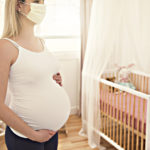As Vietnam embarks on an unprecedented COVID-19 vaccination campaign to achieve community immunity, vaccine safety and eligibility are top concerns for many, especially pregnant women. So, can pregnant women get the COVID-19 vaccine? Let’s find out.
1 Can Pregnant Women Get the COVID-19 Vaccine?
According to Dr. Tran Thu Nguyet (Vietnam Institute of Applied Medicine), pregnant women are at increased risk of severe illness and death from COVID-19, and the virus may also adversely affect their unborn babies. Therefore, getting vaccinated is essential for protection.
However, the World Health Organization (WHO) currently recommends that there is limited data on the safety of COVID-19 vaccines during pregnancy. As a result, pregnant women may be offered vaccination if the benefits outweigh the potential risks.
Given the current severe outbreak, pregnant women are vulnerable to severe complications. The Ministry of Health has directed healthcare providers to identify and create a list of pregnant women from 13 weeks onwards and organize COVID-19 vaccinations at healthcare facilities with emergency obstetric care capabilities.
Additionally, providers must conduct pre-vaccination screenings following the Ministry of Health’s guidelines. They should not offer a choice of vaccines or delay vaccination, but instead, administer the vaccine according to the manufacturer’s instructions and registered with the Ministry of Health.
Referring to the Ministry of Health’s “Temporary Guidelines for Pre-vaccination Screening for COVID-19”, pregnant or breastfeeding women are contraindicated for the Sputnik V COVID-19 vaccine.
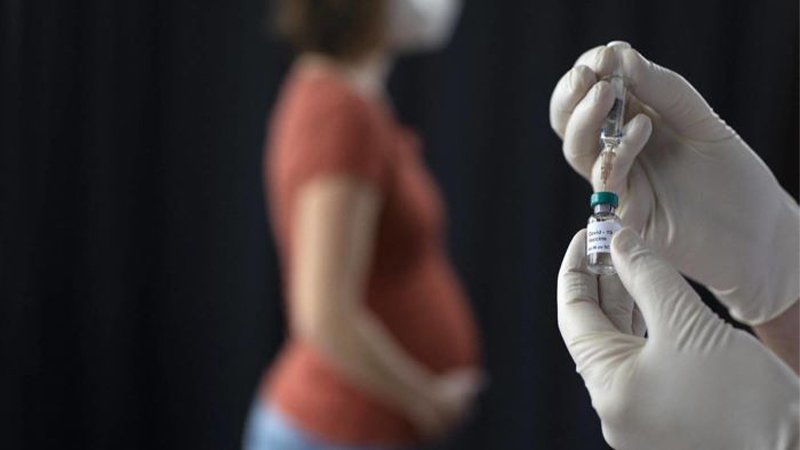 The Ministry of Health is currently delaying the COVID-19 vaccination for pregnant women
The Ministry of Health is currently delaying the COVID-19 vaccination for pregnant women
2 What Should Pregnant Women Keep in Mind During the COVID-19 Pandemic?
- Wash your hands frequently with soap and water for at least 30 seconds. If soap and water are not available, use hand sanitizers containing at least 60% alcohol and avoid touching your eyes, nose, and mouth to prevent infection.
- Always wear a face mask when going out, ensuring it covers your mouth and nose, and avoid touching it while wearing it. Dispose of single-use masks properly and wash your hands afterward.
- Pregnant women should focus on immune-boosting foods like vitamin C-rich, vitamin D-rich, and zinc-rich foods, as well as probiotics.
- Drink about 3 liters of water daily and aim for 7-8 hours of sleep each night.
- Gentle exercise can improve blood circulation and enhance the immune system for pregnant women.
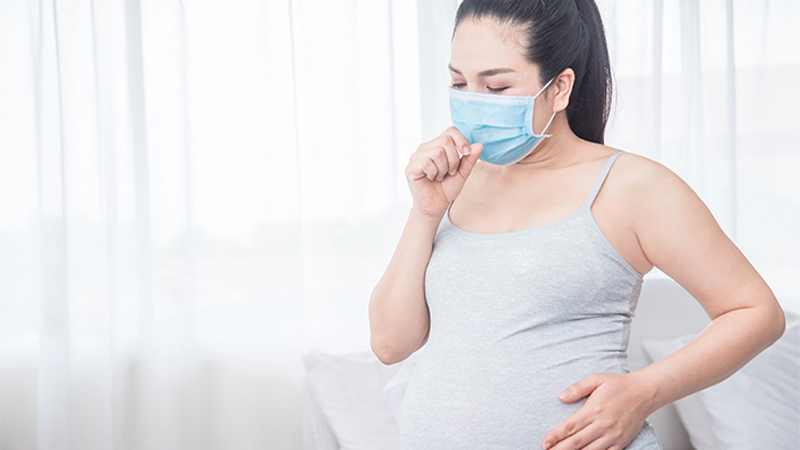 Always wear a face mask when going out and wear it properly
Always wear a face mask when going out and wear it properly
3 What Should Pregnant Women Keep in Mind Before and After Getting the COVID-19 Vaccine?
Before Getting the COVID-19 Vaccine
Pregnant women should maintain their regular diet, adequate sleep, and a relaxed mindset. During the pre-vaccination screening, the doctor will examine the pregnant woman, measure the fetal heart rate, and review her pregnancy records to assess the health of the mother and the fetus.
Based on this assessment, the doctor will provide advice and guidance on whether to proceed with vaccination. Therefore, pregnant women should bring their complete prenatal test records to the vaccination site.
When going to the hospital for vaccination, pregnant women should follow the 5K guidelines and arrive at the appointed time to ensure safety and social distancing.
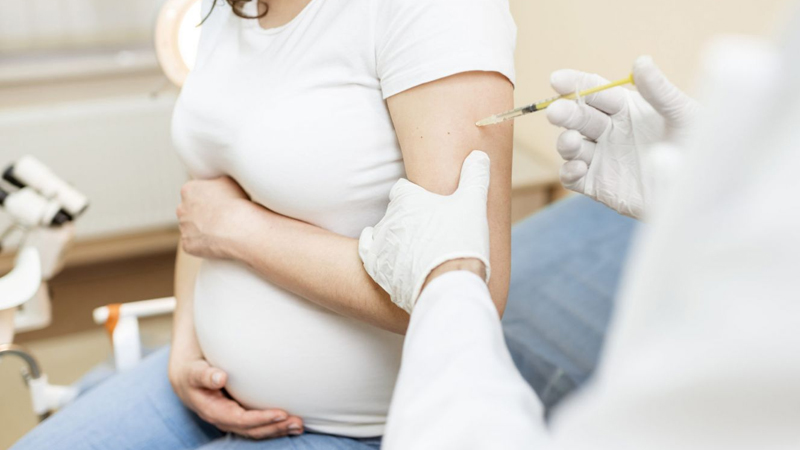 Pregnant women should maintain a normal diet, sleep, and lifestyle before vaccination
Pregnant women should maintain a normal diet, sleep, and lifestyle before vaccination
After Getting the COVID-19 Vaccine
According to the Ministry of Health, common side effects after receiving the COVID-19 vaccine include fever, headache, fatigue, nausea, chills, and muscle pain. These are normal reactions as the body responds to the vaccine. If a pregnant woman experiences these symptoms and a fever above 38°C, she can take fever-reducing medication.
Obstetricians currently prescribe fever-reducing medications following the Ministry of Health’s guidelines, including acetaminophen, paracetamol, and panadol. Pregnant women can take 2-3 tablets per day, spaced 4-6 hours apart (maximum 4 tablets/day), depending on the fever. These reactions typically subside within 48-72 hours.
If a high fever of 39-40°C persists for 4-5 days and is accompanied by other symptoms such as cough, runny nose, productive cough, high fever, or difficulty breathing, the pregnant woman should seek immediate medical attention. These could be signs of another illness rather than a side effect of the vaccine.
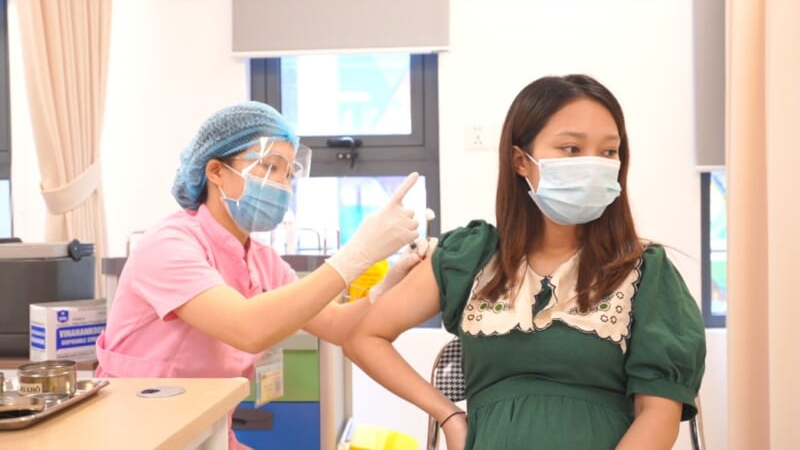 Seek medical attention if you experience a persistent high fever after vaccination
Seek medical attention if you experience a persistent high fever after vaccination
Although Ho Chi Minh City is currently delaying COVID-19 vaccination for pregnant women, it is inevitable that this will become necessary in the future. Therefore, pregnant women should follow the advice in this article and adhere to the 5K message from the Ministry of Health to protect themselves and their unborn babies. We wish you good health.
Exploring the Pros and Cons of Investing in a Foot Massager
Looking to improve your health and wellbeing? A foot massager may be the perfect option for you. You’ll find out in this article who should be using a foot massager, as well as the health benefits it may offer and the precautions to take when purchasing and using one. Read on to learn more about the potential benefits of a foot massager.
The Hidden Financial Risks for Pregnant Women from COVID-19 Outbreak
In a scientific study, researchers examined data from 598 hospitalized pregnant women with positive results for COVID-19. They discovered that approximately 75% of these women were asymptomatic, highlighting the potential for pregnant individuals to carry and transmit the virus without displaying any symptoms. This finding emphasizes the importance of regular testing and precautions to prevent the spread of COVID-19, especially among pregnant women. The study also revealed a higher likelihood of preterm birth and cesarean delivery among COVID-19 positive pregnant women, reinforcing the need for additional care and monitoring during pregnancy for those affected by the virus. By understanding the impact of COVID-19 on pregnant individuals, healthcare providers can better support and protect this vulnerable population.



























